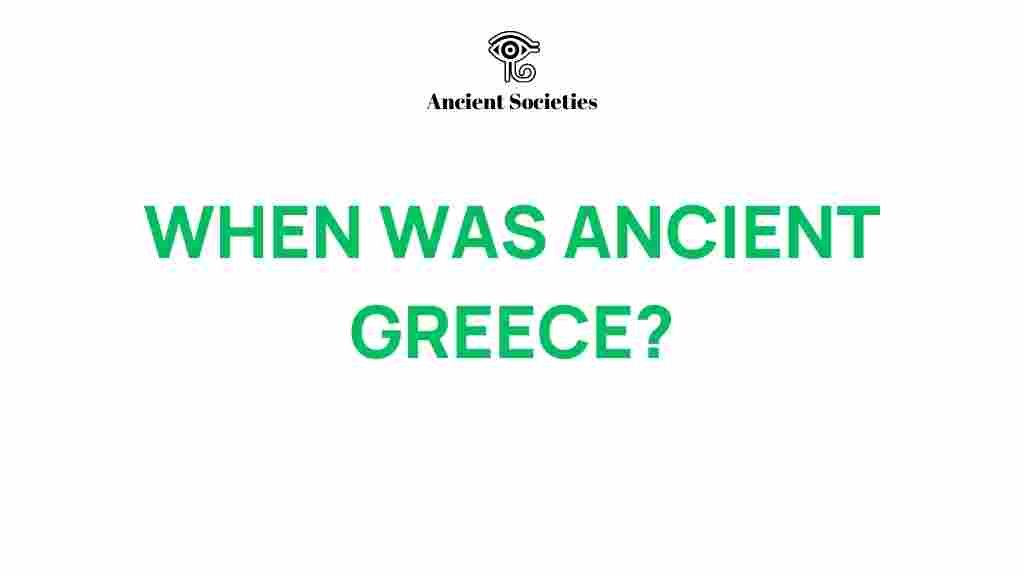Unraveling the Mysteries of Ancient Greece
The allure of Ancient Greece has captivated historians, philosophers, and travelers for centuries. This remarkable civilization, with its profound influence on modern society, offers a tapestry of history, culture, and philosophy that continues to inspire us today. In this article, we will embark on a journey through time to explore the history, culture, and achievements of Ancient Greece, unraveling the mysteries that surround this fascinating civilization.
Understanding the Timeline of Ancient Greece
The timeline of Ancient Greece spans several centuries and is divided into distinct periods. Each period contributed uniquely to the development of Greek civilization.
- Neolithic Period (c. 7000-3000 BCE): Early farming communities begin to form.
- Bronze Age (c. 3000-1100 BCE): The rise of the Minoan and Mycenaean civilizations.
- Dark Ages (c. 1100-800 BCE): A period of decline and limited written records.
- Archaic Period (c. 800-500 BCE): The emergence of city-states and the beginnings of democracy.
- Classical Period (c. 500-323 BCE): A peak in art, culture, and philosophy, marked by figures like Socrates, Plato, and Aristotle.
- Hellenistic Period (c. 323-30 BCE): The spread of Greek culture following the conquests of Alexander the Great.
Each of these periods played a significant role in shaping the future of Western civilization.
The Cultural Richness of Ancient Greece
Ancient Greece was not just a civilization built on politics and war; it was rich in culture and the arts. The Greeks made significant contributions in various fields:
- Art and Architecture: The Parthenon and other classical structures symbolize Greek architectural brilliance.
- Literature: Epic poets like Homer and playwrights such as Sophocles and Euripides laid the foundations for Western literature.
- Philosophy: Greek philosophers explored fundamental questions about existence, ethics, and knowledge.
- Mythology: The pantheon of Greek gods and goddesses influenced literature, art, and religion.
This rich tapestry of culture reflects the values and beliefs of the people of Ancient Greece.
The Philosophical Foundations of Ancient Greece
The philosophy of Ancient Greece is perhaps its most enduring legacy. The Greeks sought to understand the world around them through reason and inquiry. Key figures include:
- Socrates: Known for the Socratic method, he emphasized ethical inquiry.
- Plato: A student of Socrates, he wrote dialogues and founded the Academy in Athens.
- Aristotle: A student of Plato, he made significant contributions to logic, biology, and ethics.
These thinkers laid the groundwork for Western philosophy and science, influencing countless generations.
Democracy: The Birthplace of Political Freedom
One of the most significant contributions of Ancient Greece to modern civilization is the concept of democracy. The city-state of Athens is often credited as the birthplace of democracy, where citizens participated directly in decision-making. Key features of Athenian democracy included:
- Direct Participation: Citizens could speak and vote on laws and policies.
- Equality Before the Law: The principle that all citizens had equal rights in the political sphere.
- Public Debate: Forums for discussing policies and issues were open to all citizens.
This revolutionary political system has influenced many modern democracies around the world.
The Influence of Ancient Greece on Modern Society
The impact of Ancient Greece is evident in various aspects of contemporary life:
- Language: Many English words and terms have Greek origins.
- Government: The principles of democracy and civic involvement are rooted in Greek practices.
- Arts and Literature: The themes and forms established by Greek writers and artists continue to resonate.
- Philosophy and Ethics: Greek philosophical ideas continue to be fundamental in modern philosophical discourse.
Understanding the influence of Ancient Greece helps us appreciate the foundations of our own culture and society.
Archaeological Discoveries: Unveiling the Past
Archaeology plays a crucial role in uncovering the mysteries of Ancient Greece. Significant archaeological sites include:
- Delphi: Once considered the center of the world, home to the Oracle of Delphi.
- Olympia: The site of the ancient Olympic Games.
- Knossos: A Minoan palace that reveals insights into early Greek civilization.
These sites provide tangible links to the past, allowing us to piece together the lives of the ancient Greeks.
Troubleshooting Common Misconceptions
As we explore the history and culture of Ancient Greece, several common misconceptions arise:
- Mythology as Fact: Many view Greek myths as literal truths rather than allegorical stories.
- Democracy for All: Athenian democracy was limited to male citizens, excluding women, slaves, and foreigners.
- Homogeneity: Greece was not a single culture but a collection of diverse city-states with varying customs and practices.
Addressing these misconceptions helps foster a more accurate understanding of this complex civilization.
Conclusion: The Enduring Legacy of Ancient Greece
In conclusion, the journey through the history, culture, and achievements of Ancient Greece reveals a civilization that has profoundly shaped our world. From the foundations of democracy and philosophy to the artistic and literary contributions, the legacy of Ancient Greece continues to resonate. By unraveling the mysteries of this remarkable civilization, we gain insights that enrich our understanding of our own society.
For further reading on the influence of Ancient Greece in modern times, visit this link. To dive deeper into archaeological findings, check out this resource.
This article is in the category History and created by AncientSocieties Team

2 thoughts on “Unraveling the Mysteries of Ancient Greece: A Journey Through Time”